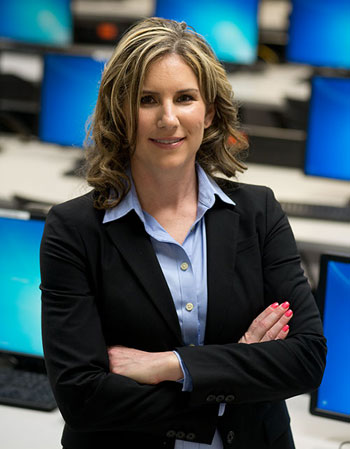Posted on September 9, 2014 by Lety Laurel

Michele Maasberg
The Kudla Fellows program is a prestigious and competitive graduate fellowship program established through the generosity of UTSA alumni Frank ’85 and Nancy Kudla MBA ’87. Their $500,000 gift supports graduate student research and education in cyber security.
Maasberg, the inaugural recipient of this fellowship, is a doctoral student majoring in information technology. During her military career she graduated from the U.S. Naval Academy at Annapolis and flew antisubmarine warfare and combat search and rescue missions overseas before retiring as a lieutenant commander in 2006.
As a civilian, Maasberg explored her love of technology working on global health record systems with both the U.S. Navy and U.S. Army in Virginia. Even after earning numerous certifications, Maasberg wanted to formalize her education in a top-ranked cyber security program.
“I researched the best programs and selected UTSA,” said Maasberg who earned her master’s degree in information assurance from UTSA in 2013. “UTSA has a good reputation in cyber security.”
Gaining technical experience in her graduate classes, Maasberg enjoyed the hands-on work. “I learned the formal process for how incident responses should be handled when investigating a virtual machine compromised with a variety of malware,” she said. “I realized I wanted to continue my education and pursue a Ph.D.”
As a doctoral student, Maasberg is conducting research with faculty members Nicole Beebe and Darrell Carpenter on insider threat. Most recently she has had a paper published in the Journal of Information Privacy and Security and will present another paper at an upcoming security conference.
“I’m looking at the correlation between addiction theory and insider threat,” said Maasberg. “Studying the risks of insider threat using this behavioral model is unusual.” An insider threat is a danger posed by trusted members of an organization.
“Obtaining a Ph.D. is a full-time job,” Michele Maasberg said. “But throughout my studies, I’ve been motivated by my fellowship. I’ve worked hard this past year on my research so that my donors can see the progress that I’m making in the world of cyber security. Their support of my education makes me want to achieve more.”
Wendy Frost—
Please send your comments to: wendy.frost@utsa.edu


